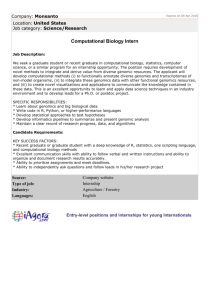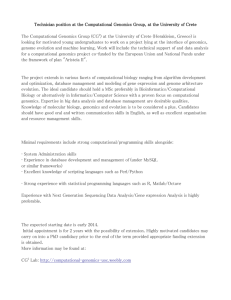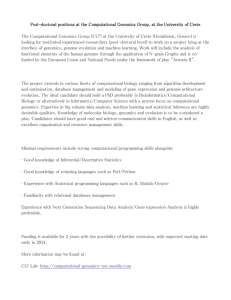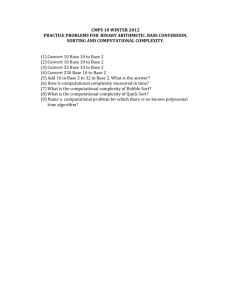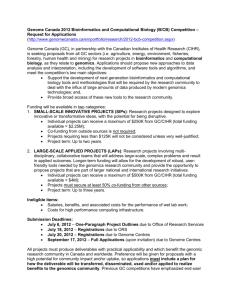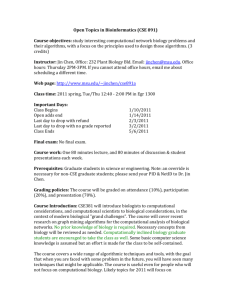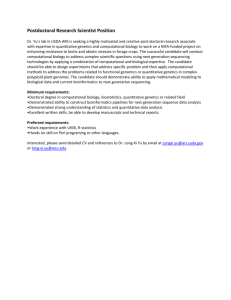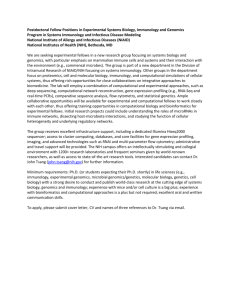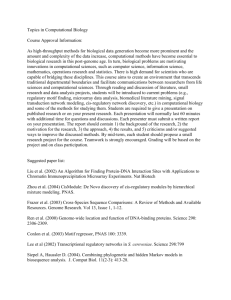Imperial College London Job Description Job Title: Research
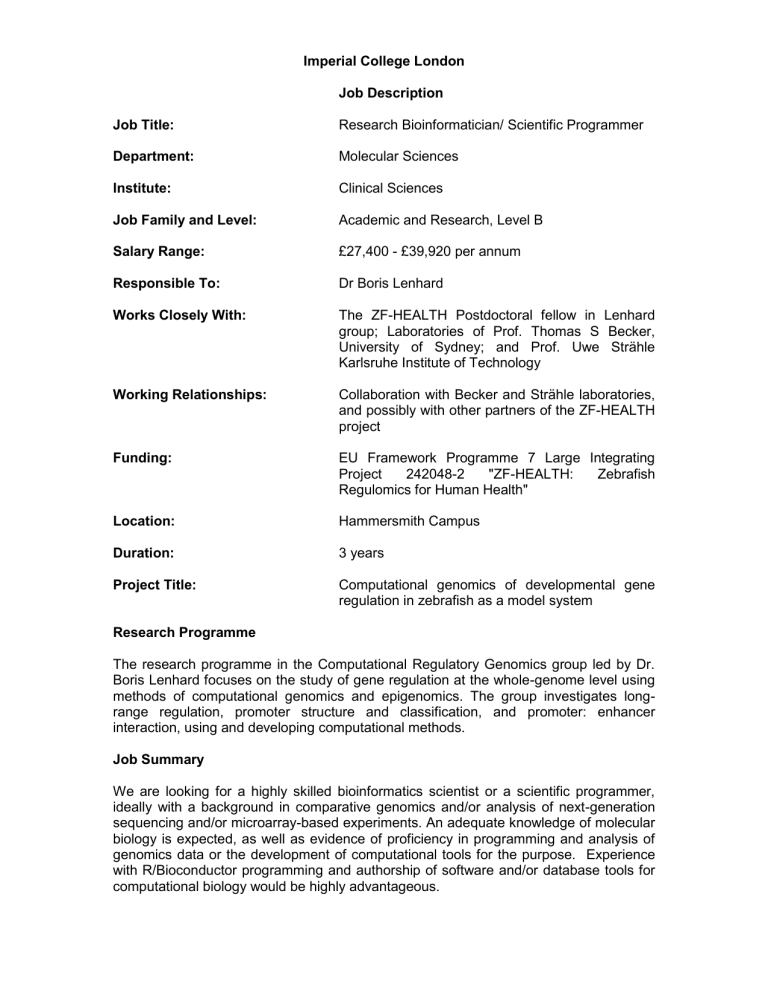
Imperial College London
Job Description
Research Bioinformatician/ Scientific Programmer Job Title:
Department:
Institute:
Job Family and Level:
Salary Range:
Responsible To:
Works Closely With:
Molecular Sciences
Clinical Sciences
Academic and
Dr Boris Lenhard
Research, Level B
£27,400 - £39,920 per annum
The ZF-HEALTH Postdoctoral fellow in Lenhard group; Laboratories of Prof. Thomas S Becker,
University of Sydney; and Prof. Uwe Strähle
Karlsruhe Institute of Technology
Working Relationships: C ollaboration with Becker and Strähle laboratories, and possibly with other partners of the ZF-HEALTH project
Funding: EU Framework Programme 7 Large Integrating
Project 242048-2 "ZF-HEALTH: Zebrafish
Regulomics for Human Health"
Location:
Duration:
Project Title:
Hammersmith Campus
3 years
Computational genomics of developmental gene regulation in zebrafish as a model system
Research Programme
The research programme in the Computational Regulatory Genomics group led by Dr.
Boris Lenhard focuses on the study of gene regulation at the whole-genome level using methods of computational genomics and epigenomics. The group investigates longrange regulation, promoter structure and classification, and promoter: enhancer interaction, using and developing computational methods.
Job Summary
We are looking for a highly skilled bioinformatics scientist or a scientific programmer, ideally with a background in comparative genomics and/or analysis of next-generation sequencing and/or microarray-based experiments. An adequate knowledge of molecular biology is expected, as well as evidence of proficiency in programming and analysis of genomics data or the development of computational tools for the purpose. Experience with R/Bioconductor programming and authorship of software and/or database tools for computational biology would be highly advantageous.
The post is funded by the EU Framework Programme 7 to investigate sequence, epigenetic and evolutionary properties of chromosomal regions in the neighbourhood of developmental regulatory regions in vertebrates, and to devise approaches to study them in zebrafish as a model organism. These regions are conserved across all vertebrates and implicated in cancer and a number of important heritable diseases. Their existence in all vertebrates enables one to establish zebrafish as an efficient model system for human biology and disease related to developmental misregulation. The computational resources needed to study these phenomena include software tools for the analysis of enhancer and promoter elements, web-based resources for the integration and visualization of sequence and epigenetic experiments, and databases of expression patterns of regulatory elements tested in zebrafish.
The post is a unique opportunity to work on developing cutting-edge computational approaches and resources in the most rapidly growing field of research, in one of the leading research environments in Europe and the world. The post holder will have the opportunity to work with a worldwide network of collaborators, attend scientific conferences, and publish the results of their work.
Research Duties
To participate in the planning and conducting of research within ZF-HEALTH and the Group's core program
To conduct and plan own work with appropriate supervision
To assist in the training of undergraduate and postgraduate research students and research assistants as required
To identify and develop suitable techniques for the analysis and visualisation of data, and to build and maintain the associated computational resources (software packages, databases, or web-based analysis and visualization tools)
To analyse, manage and communicate data and software tools
To ensure the validity and reliability of data and methods at all times
To maintain accurate and complete records of all analyses
To document exhaustively the source code of developed resources and tools
To present tools to colleagues and at conferences
To publish in high quality journals and to present the resources at national and international meetings
To attend relevant workshops and conferences as necessary
To promote the reputation of the Group, the Department and the College
To participate actively in the research programme of the Group and Unit
To participate in Group/Unit research meetings and internal seminars
To collaborate with other allied scientists and developers within Imperial College and elsewhere in London and abroad, as appropriate
To contribute to the smooth running of the Group’s/Unit’s laboratories and facilities with other scientists, clinicians, technicians and students within the laboratories
To comply with the College, Division, and Unit safety practices and to attend courses on safety when appropriate
Any other duties as may be deemed reasonable by Head of Group as well as
Head of Division/Department/Section
Other Duties
To undertake appropriate administration tasks
To attend relevant meetings
To comply with relevant College policies, including Financial Regulations, Equal
Opportunities Policy, Promoting Race Equality Policy, Health and Safety Policy,
Information Systems Security Policy, Intellectual Property Rights and Register of
Interests Policies
To be willing to work out of normal working hours (including weekends) if the requirements of the project demand
To undertake any necessary training and/or development
Any other duties commensurate with the grade of the post as directed by supervisor
Job descriptions cannot be exhaustive and so the post holder may be required to undertake other duties, which are broadly in line with the above key responsibilities.
The post holder is expected to observe and comply with all College policies and regulations, for example Health and Safety, Data Protection etc.
Imperial College is committed to equality of opportunity and to eliminating discrimination. All employees are expected to adhere to the principles set out in our Equal Opportunities in Employment Policy, Promoting Race Equality Policy and Disability Policy and all other relevant guidance/practice frameworks.
Person Specification
Qualifications
PhD in computational biology or a related discipline or equivalent research, industrial or commercial experience
Knowledge / Experience
Essential:
Knowledge of molecular biology and genomics
Knowledge of applications of statistics in molecular biology, genomics or population genetics
Strong publication record in high quality journals
Background in comparative genomics, computational epigenomics or computational analysis of gene regulation
Evidence of high level of proficiency in at least one general programming language
(Peri, Python or C+++ are preferred)
Experience with programming and analysis of next generation sequencing data
Desirable:
Experience with programming and analysis of next generation sequencing data in
R/Bioconductor.
Applications of machine learning, Bayesian data analysis and linear algebra in computational biology
Experience with extraction and analysis of genome-wide data from ArrayExpress,
GEO, Ensembl and/or UCSC Genome Browser.
Track record of authorship of software and/or database tools for computational biology
Skills and Abilities
Evidence of ability to organise and conduct complex research projects with minimum of supervision.
Ability to prioritise own work in response to deadlines.
Good written and verbal communication skills in English.
Evidence of ability to write scientific papers independently.
Ability to work effectively with researchers at all career stages, from computer scientists to experimental biologists.
Ability to work both independently and as part of a team.
Ability to solve problems creatively
Ability to prioritise own work in response to deadlines
Ability to direct the work of a small research team and motivate others to produce a high standard of work
Ability and eagerness to learn new concepts and skills in biology and computing rapidly, and to seek novel and creative solutions to scientific problems.
Personal Attributes
High level of motivation and drive, and the desire to become an independent investigator.
Willingness to work as part of a team and to be open-minded and cooperative
Willingness to share knowledge and skills with other members of the group on a daily basis.
Flexible attitude towards work
Discipline and regard for confidentiality and security at all times
Willingness to undertake any necessary training for the role
Willingness to travel both within the United Kingdom and abroad to conduct research and attend conferences
Application Guidance
Please read the person specification carefully and describe, as part of your application, how much you feel you meet each of the criteria. If you need more space, please attach additional sheets to the application form.
The recruitment monitoring section of your application will be detached and will be used only for monitoring and audit purposes as a basis for supporting our commitment to
Equal Opportunities.
An application form and full CV quoting reference number HM2012059 should be sent, online via the Imperial College iRecruitment website.
Shortlisted candidates will be contacted as soon as possible after the closing date.
Thank you for your interest in this post. We look forward to receiving your application.
